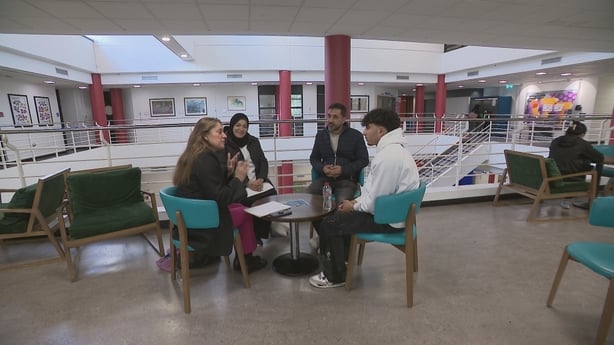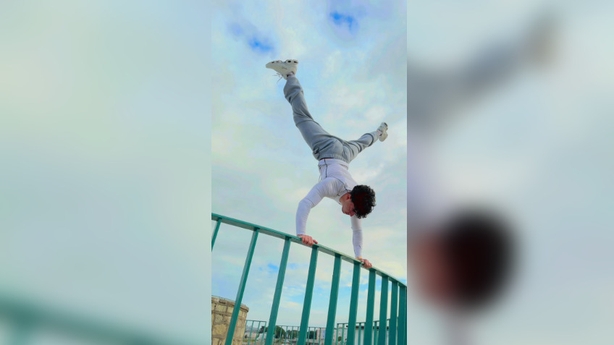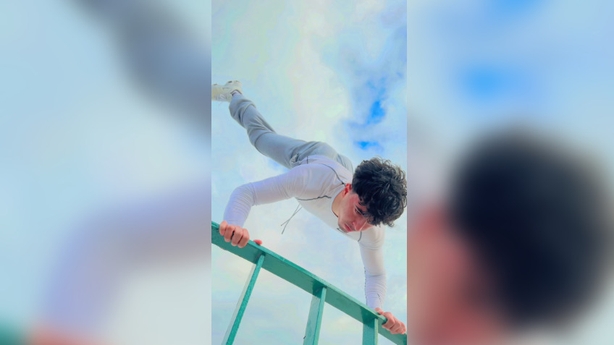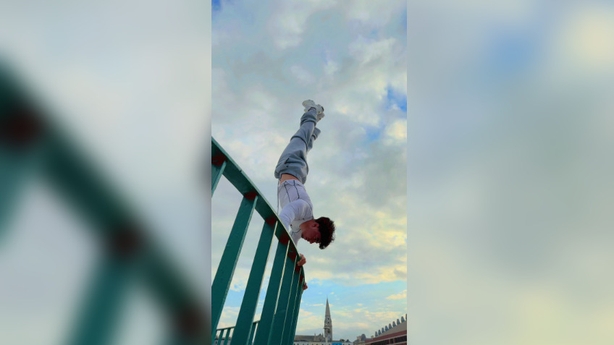The Union of Students in Ireland has called on the Government to give young people fleeing the war in Palestine the same accommodations in terms of third-level fees as those enjoyed by students from Ukraine.
This year, Minister for Further and Higher Education Patrick O'Donovan again waived for Ukrainians restrictions which require any student who has not lived in Ireland or the EU for the past three years to pay "international" college fees.
Those fees amount to between €10,000 and €30,000 annually.
USI President Chris Clifford told RTÉ News: "Universities were rightly given money by the Government to cover the fees of Ukrainian students. The same should be done for all students seeking refuge."
The student body has called for a central policy for how students from Gaza in particular should be supported in universities and colleges here.
"They did not just choose to come and live here but are fleeing dangerous situations. The fact they have secured a place despite what they have faced is a huge achievement and one we should be supporting and encouraging," he said.
One such young Palestinian received some good news in recent days.
Kamal Malaka has lived in Ireland for two years. He sat his Leaving Certificate exams last June at Dublin’s Holy Child Community School and last month he received the offer of a college place.
But then Kamal was told he would have to pay fees of more than €13,000 to take up his place in Cloud Computing at TU Dublin.
That is an impossible sum of money for his family.
His father is an Irish citizen. He was granted asylum here a number of years ago after he fled Gaza.
Kamal and his mother and siblings were finally able to join their dad in 2022, their arrival delayed until then by Covid.
Kamal’s father had raised the family’s difficulties with local politicians and others and last week the family got good news. TU Dublin, where Kamal will study Cloud Computing, would waive his fees.
"I’m really happy and I’m looking forward to it," Kamal said. "I already lost two years of my life because due to previous wars we could not get any study done, and I don’t want to lose any more."

More supports for third level students fleeing the war in Palestine was a central demand of students who took part in protests and encampments at university campuses here earlier this year.
But while some colleges are looking sympathetically on individual cases, the Union of Students in Ireland says there needs to be a national policy for students from Palestine just as there is one for those from Ukraine.
Read more: Government indicates it will waive university fees for Ukrainian students
"Universities were rightly given money by the Government to cover the fees of Ukrainian students. The same should be done for all students seeking refuge" USI President Chris Clifford said.
"We need a proper policy so that everyone can understand what is happening around fees, and to give clarity to both students and institutions," he said.
"Many of these students hold Irish passports but are not being offered free fees because they have only moved here recently. Some are being accommodated through scholarships, while others are just left in limbo."
Izzeddin Hammad is one such student. Izzedin has close family connections to Ireland and he and his family escaped Gaza through the Rafah crossing with the support of the Irish Government earlier this year and were given refuge in Ireland.
Izzeddin was offered a place in TU Dublin where he can resume studies he began in Gaza, joining 2nd year on their BSc in Computing with Machine Learning and Artificial Intelligence.
However, he has been told he must pay €3,000 in fees.
"First they asked for €13,500, now it has been reduced to €3,000," his father Issam said.
But even €3,000 is an impossible sum for this family.
"We have lost everything," Issam explained.
In Gaza he was the regional manager of the largest healthcare company in Palestine and so the family used to be well off.
"But all of my savings were in real estate, and now everything is gone," Issam said, referring to the Israeli bombardment of Palestine which has destroyed whole swathes of Gaza.
'Gaza is like a big prison'
Kamal had no English when he arrived in Ireland from Gaza two years ago. Now he speaks with ease and fluency.
But the 20-year-old is quietly spoken and understated as he describes what life was like growing up in Gaza.
He pulls up his sleeve to show me a scar from when he was hit by shrapnel from an Israeli mortar while playing with his friends when he was 10.
Growing up in the midst of war there was one thing that kept Kamal going.
"Gaza is like a big prison. When you are in prison you always try and find something to distract you so that you don't feel anxious all the time. So to take out the negative energy we used to go to the beach, practicing parkour and calisthenics," he said.
Calisthenics and parkour are both forms of gymnastics that rely on core strength and skill. Neither requires much by way of equipment, which made it an ideal pursuit for youngsters in Gaza.
"[Growing up in Gaza] was really really tough. We used to go to the beach to practice, so that we could forget what was going on."
Kamal shows me videos of young teens - himself and his friends - on the beach in Gaza. The light from the late evening sun is low and warm. The children have buried an old tyre in the sand, to use as a kind of mini trampoline. Kamal explains that the soft sand made the beach ideal for practice.
"We used to watch videos on YouTube," he explains.
"[We thought] if they are able to do it, why don't we give it a try? We didn't have any equipment but we overcame this challenge."
He points out friends in the videos.
"Some of [my friends] are still alive, some of them they died due to the bombing"
He points out one child (this video is a few years old) who he knows is now dead.
His "best best friend Mohammed" is among those killed.
"People are dying and nothing is left. You are feeling it's a lie, like you just cannot believe it. It's really hard."



Kamal’s mother and father list the close family members who have been killed. It is difficult to keep count, but they include Kamal’s grandfather, an aunt, uncle, many first cousins, and second cousins.
Kamal shows me a video of him somersaulting down Al-Rashid Street on Gaza’s waterfront. The video is several years old. That street is now rubble.
"That is where all the tank s came."
He shows me videos of friends who remain in Gaza, doing parkour amid the rubble of bombed buildings.
Kamal also shows me videos of Ireland. In one he raises himself by his arms on railings by the sea in Dún Laoghaire until he is doing a perfect handstand. In another video Kamal somersaults down the town’s main street.
The fact that Kamal has had his college fees waived may seem a small comfort, but it means Kamal can see a future for himself.
"I want to study, to become someone to contribute... to do the things that I love and am passionate about and to try to help others. Because I've been through a lot of things, so I can use that experience to help others."







